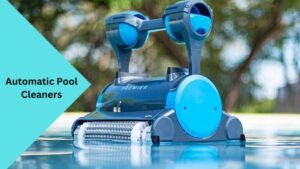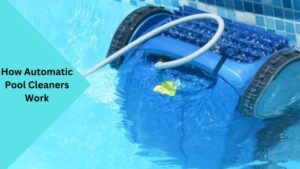Are you tired of spending countless hours manually scrubbing and vacuuming your pool? Fortunately, modern technology has come to the rescue with automatic pool cleaners. These ingenious devices have revolutionized the way we maintain our pools, making the task infinitely easier and more convenient.
In this article, we will explore the inner workings of automatic pool cleaners and unravel the mysteries behind their efficient cleaning process. Whether you’re a pool owner looking to optimize your pool cleaning routine or simply curious about the technology behind these devices, you’re in the right place. Let’s dive in and discover how automatic pool cleaners work.
- Understanding Automatic Pool Cleaners
- How Do Automatic Pool Cleaners Work?
- Exploring Different Types of Automatic Pool Cleaners
- Are Automatic Pool Cleaners Worth It?
- How Long Do Automatic Pool Cleaners Last?
- The Effectiveness of Robotic Pool Cleaners
- How Long Does it Take an Automatic Pool Cleaner to Clean a Pool?
- Conclusion
Understanding Automatic Pool Cleaners
Before we delve into the nitty-gritty details, let’s take a moment to familiarize ourselves with what automatic pool cleaners are. These devices are designed to autonomously clean the surfaces of swimming pools, taking the burden off pool owners while ensuring the pool remains sparkling clean. Gone are the days of manually scrubbing and trapping debris with handheld equipment. Automatic pool cleaners are equipped with advanced features and mechanisms to navigate the pool, vacuum up dirt, and maintain proper water circulation.
How Do Automatic Pool Cleaners Work?

Now that we have a general understanding of automatic pool cleaners, let’s explore the fascinating world of their inner workings. Each type of automatic pool cleaner operates slightly differently, but their primary goal is to remove debris from the pool.
-
Suction-Side Pool Cleaners
Suction-side pool cleaners operate by connecting to the suction line of the pool’s filtration system. These cleaners utilize the power of the pool’s pump to generate suction, which not only propels the cleaner but also sucks up dirt and debris. The collected debris is then captured in the pool’s filter system, ensuring a thorough cleaning process.
-
Pressure-Side Pool Cleaners
Pressure-side pool cleaners work by utilizing the pressure generated by the pool’s water return jets. These cleaners connect to the return line, where the pressurized water powers the cleaner’s movement. As the cleaner moves around the pool, it uses jets, brushes, and scrubbers to dislodge and collect debris, which is then captured in a dedicated debris bag.
-
Robotic Pool Cleaners
Robotic pool cleaners are the pinnacle of automated pool cleaning technology. These intelligent machines are entirely self-contained and do not rely on the pool’s filtration system or water pressure. Robotic cleaners navigate the pool using advanced algorithms and sensors, actively mapping the pool’s surface to ensure comprehensive cleaning. They employ brushes and scrubbers to remove dirt and debris while simultaneously vacuuming the pool. The collected debris is stored in a built-in filter cartridge, which can be easily emptied after the cleaning cycle.
-
Self-Cleaning Pools
In recent years, self-cleaning pools, also known as in-floor cleaning systems, have gained popularity for their ability to maintain a clean pool automatically. These systems are installed during the pool construction process and consist of strategically placed cleaning nozzles on the pool floor. When activated, these nozzles create water jets that push dirt and debris toward the pool’s main drain. From there, the debris is filtered out, leaving the pool effortlessly clean.
Exploring Different Types of Automatic Pool Cleaners
Now that we have a grasp of how automatic pool cleaners work, it’s time to take a closer look at the different types available on the market. Understanding the unique features and capabilities of each type will help you make an informed decision when choosing the right cleaner for your pool.
-
Suction-Side Pool Cleaners
Suction-side pool cleaners, as mentioned earlier, rely on the suction generated by the pool’s pump. These cleaners are typically more affordable and easy to install, making them a popular choice for pool owners. They excel at removing small to medium-sized debris, such as leaves, sand, and pebbles. However, they may struggle with larger debris and require regular filter cleanings to maintain their efficiency.
-
Pressure-Side Pool Cleaners
Pressure-side pool cleaners utilize the water pressure from the pool’s jets to propel themselves and collect debris. These cleaners are known for their powerful scrubbing and sweeping capabilities, making them suitable for pools with heavier debris loads. They often come with an additional booster pump to ensure optimal performance. While pressure-side cleaners can handle large debris, smaller particles may still bypass the filters, requiring supplementary cleaning.here is a complete guide about How To Prime a Pool Pump: Tips and Tricks for Smooth Operation
-
Robotic Pool Cleaners
Robotic pool cleaners are the epitome of technological advancement in pool maintenance. These autonomous devices require no plumbing connections and operate independently from the pool’s filtration system. Robotic cleaners offer exceptional cleaning results, efficiently removing debris of all sizes, including fine particles like dust and algae. While they may come with a higher price tag, their efficiency, ease of use, and energy-saving features make them a worthwhile long-term investment.
-
Self-Cleaning Pools
Unlike the other types of pool cleaners, self-cleaning pools eliminate the need for a separate cleaning device altogether. These innovative pools are equipped with in-floor cleaning systems that automatically remove debris, ensuring a consistently clean swimming experience. While self-cleaning pools require initial installation during pool construction and additional cost, they provide unparalleled convenience and a worry-free pool maintenance experience.
Are Automatic Pool Cleaners Worth It?
As a pool owner, you may be wondering if investing in an automatic pool cleaner is truly worth the cost. The short answer is yes, and here’s why:
- Time-saving: By taking on the laborious task of pool cleaning, automatic cleaners free up your valuable time, allowing you to enjoy your pool without the hassle.
- Effortless Maintenance: With automatic cleaners, you no longer need to manually scrub and vacuum the pool. These devices handle the dirty work on your behalf, ensuring your pool remains clean and inviting.
- Improved Water Quality: Automatic pool cleaners work diligently to remove debris, preventing the buildup of bacteria, algae, and other contaminants. This results in cleaner, healthier water for you and your loved ones to enjoy.
- Reduced Chemical Usage: Proper pool maintenance involves striking a balance with chemical treatments. With an automatic pool cleaner, the cleaner water allows for more effective chemical distribution, reducing the overall amount of chemicals needed.
How Long Do Automatic Pool Cleaners Last?
When considering the purchase of an automatic pool cleaner, it’s crucial to understand its lifespan. While the longevity varies depending on the type and model, most automatic pool cleaners last approximately 3 to 5 years. Regular maintenance, including proper storage and cleaning of the cleaner and its components, can help extend its lifespan. Additionally, investing in a high-quality, reputable brand often ensures more durable and long-lasting performance.
The Effectiveness of Robotic Pool Cleaners
Robotic pool cleaners have gained popularity due to their advanced technology and unparalleled cleaning abilities. These innovative devices incorporate sophisticated sensors, efficient scrubbing brushes, and powerful vacuuming capabilities. As they navigate the pool, they actively scan and map the surfaces, ensuring thorough coverage and precise cleaning. While initial investments may be higher compared to other pool cleaners, the efficiency, convenience, and energy-saving features make robotic pool cleaners a worthwhile choice for pool owners seeking optimal cleanliness.
How Long Does it Take an Automatic Pool Cleaner to Clean a Pool?
The cleaning time for an automatic pool cleaner depends on various factors, including the pool size, cleaner type, and the pool’s cleanliness. Generally, automatic pool cleaners can clean an average-sized pool within 2 to 4 hours. However, larger pools or those with heavy debris loads may require additional cleaning cycles. It’s important to consult the manufacturer’s recommendations and consider the specific features of your chosen cleaner to estimate the cleaning time accurately.
The Convenience of Self-Cleaning Pools
In-floor cleaning systems, also known as self-cleaning pools, offer unparalleled convenience for pool owners. These systems take the automatic cleaning process to the next level by integrating nozzles and jets into the pool’s design. By strategically placing these nozzles, self-cleaning pools eliminate the need for a separate cleaner. The in-floor system activates, directing the water flow to push debris towards the pool’s main drain. From there, the debris is effortlessly filtered out, leaving the pool immaculate. Although self-cleaning pools require additional investment during the construction phase, they provide a long-term solution that eliminates the need for manual cleaning or reliance on external devices.
Do You Still Need to Brush Your Pool If You Have a Robot Cleaner?
While robotic pool cleaners effectively remove debris from the pool surfaces, brushing remains an essential maintenance task, even with the presence of a robot cleaner. Brushing the pool helps prevent the buildup of algae, scale, and other contaminants on the walls and floor. The brushing action also enhances the effectiveness of sanitizers and chemicals, ensuring proper circulation and minimizing the risk of stains and discoloration. Thus, it’s recommended to continue brushing your pool periodically to maintain its pristine condition, even when benefiting from the convenience of a robot cleaner.
Conclusion
Maintaining a clean and inviting pool doesn’t have to be a daunting task. With the advent of automatic pool cleaners, pool owners can bid farewell to the days of manual scrubbing and vacuuming. Understanding how automatic pool cleaners work, the different types available, and the benefits they offer allows you to make an informed decision about optimizing your pool maintenance routine.
From suction-side and pressure-side cleaners to the advanced technology of robotic cleaners and self-cleaning pools, there is a solution to fit every pool owner’s needs. By investing in an automatic pool cleaner, you’ll save time, effort, and ultimately enjoy a cleaner, healthier pool for years to come. So why wait? Dive into the world of automatic pool cleaners and discover the true ease and efficiency of modern pool maintenance.

Greetings, fellow pool enthusiasts! I’m Turner Davis, your dedicated guide to the world of pool care and maintenance. With over a decade of experience in the field, I’ve made it my mission to transform ordinary pools into extraordinary aquatic retreats.

